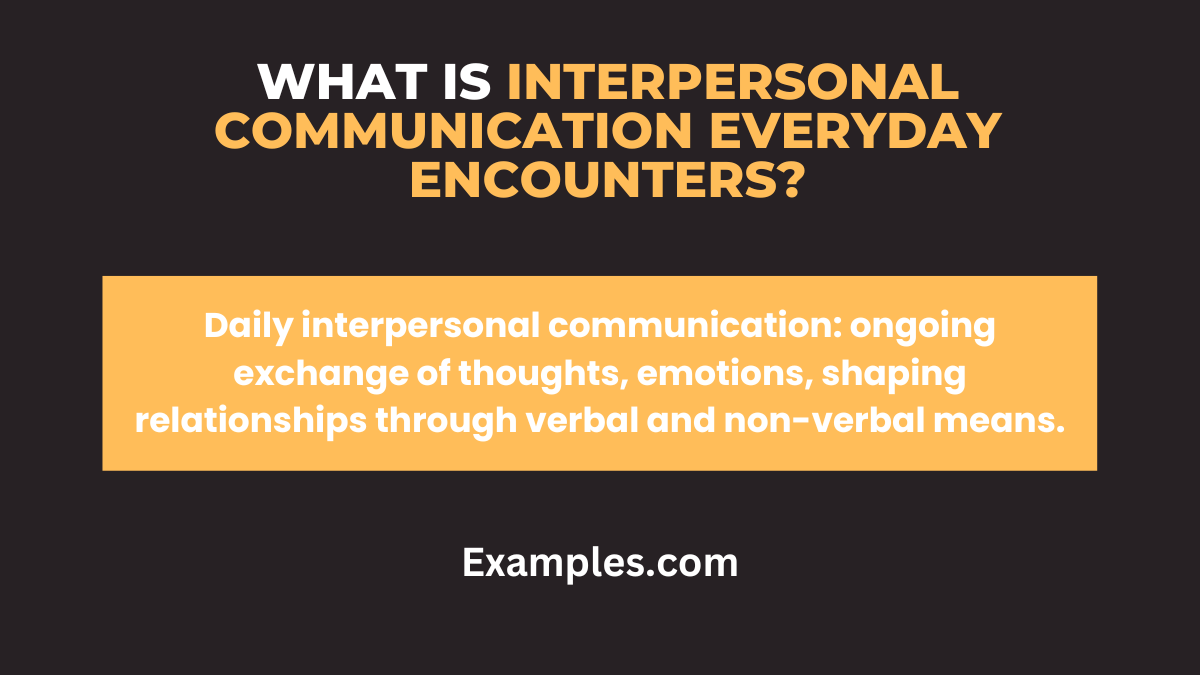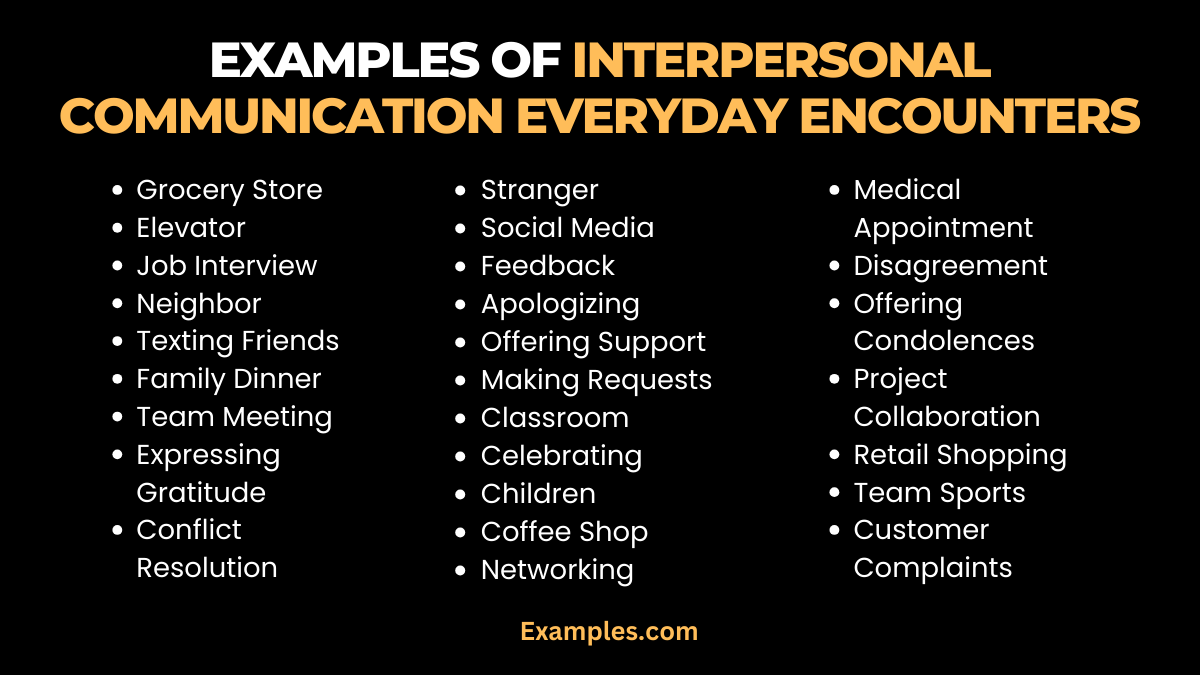29+ Interpersonal Communication Everyday Encounters Examples
Interpersonal communication in everyday encounters involves the constant exchange of information, feelings, and expressions between individuals. In these interactions, verbal communication is complemented by non-verbal cues, including body language and emotional expression, creating a rich tapestry of connection. Digital platforms have also become crucial in modern interpersonal communication, expanding the scope of everyday encounters.
What is Interpersonal Communication Everyday Encounters?

Interpersonal Communication in everyday encounters refers to the continual exchange of thoughts, feelings, and information during routine interactions. It involves both verbal and non-verbal communication methods, encompassing face-to-face conversations, digital exchanges, and group dynamics. This ongoing process plays a foundational role in shaping relationships and fostering mutual understanding in various social and professional contexts.
30 Examples of Interpersonal Communication Everyday Encounters

In everyday life, mastering interpersonal communication is vital. Here’s a list of 30 examples to illustrate its diverse applications:
- At the Grocery Store: Communicating needs with staff promotes efficiency.
- In the Elevator: Brief greetings foster a positive atmosphere.
- During a Job Interview: Clear and confident responses leave a lasting impression.
- With a Neighbor: Building rapport through casual conversations strengthens community ties.
- Texting Friends: Using emojis enhances emotional expression.

- At a Family Dinner: Active listening fosters harmonious interactions.
- In a Team Meeting: Encouraging open dialogue promotes collaboration.
- Expressing Gratitude: Saying “thank you” strengthens relationships.
- During Conflict Resolution: Using “I” statements minimizes defensiveness.
- With a Stranger: Initiating small talk can lead to meaningful connections.
- On Social Media: Engaging comments show interest in others’ perspectives.
- Giving Constructive Feedback: Focus on specific behaviors to encourage improvement.

- Apologizing Sincerely: Acknowledging mistakes and expressing regret builds trust.
- Offering Support: Listening empathetically in times of need fosters connection.
- Making Requests: Clearly stating needs helps others understand and respond.
- In a Classroom Setting: Asking questions promotes active participation.
- Negotiating: Finding common ground leads to mutually beneficial outcomes.
- Celebrating Achievements: Sharing joy reinforces positive experiences.
- With Children: Using age-appropriate language ensures understanding.
- In a Coffee Shop: Polite interactions contribute to a pleasant environment.
- Networking at an Event: Introducing oneself with confidence facilitates professional connections.

- During a Medical Appointment: Providing clear health information ensures proper care.
- Expressing Disagreement Diplomatically: Using tact preserves relationships during debates.
- Offering Condolences: Compassionate words provide comfort in difficult times.
- Collaborating on a Project: Effective communication ensures project success.
- With a Retail Associate: Clear inquiries lead to satisfying shopping experiences.
- In a Team Sports Setting: Encouraging teammates boosts morale.
- Handling Customer Complaints: Empathetic responses address concerns effectively.
- In a Religious Gathering: Sharing thoughts fosters spiritual connections.
- Navigating Public Transportation: Clear communication ensures smooth travel experiences.
Interpersonal Communication Everyday Encounters in Relationships
Interpersonal communication plays a pivotal role in nurturing and sustaining relationships. It involves the exchange of thoughts, feelings, and information between individuals, forming the foundation of meaningful connections. In relationships, understanding and applying effective communication techniques contribute to harmony and intimacy.
Verbal and Non-Verbal Dynamics
In relationships, both verbal and non-verbal communication are paramount. Verbal communication includes spoken words, while non-verbal communication encompasses gestures, body language, and facial expressions. Partners often convey emotions and intentions through non-verbal cues, reinforcing the importance of being attuned to these subtle signals.
Expressing Emotional Vulnerability
In the realm of interpersonal communication within relationships, expressing emotional vulnerability is essential. Partners must feel comfortable sharing their thoughts and feelings openly. Emotional expression fosters intimacy and helps build a deeper understanding between individuals, reinforcing the emotional bond.
Navigating Interpersonal Conflicts
Conflicts are inevitable in any relationship, and effective communication is key to resolution. Interpersonal conflicts can arise from misunderstandings, differing perspectives, or unmet expectations. Addressing conflicts requires active listening, empathy, and the ability to articulate concerns constructively. Interpersonal conflict communication strategies play a crucial role in maintaining relationship health.
Building Trust Through Communication
Trust is the bedrock of any healthy relationship, and effective communication is a primary catalyst for building and maintaining trust. Building trust through communication involves transparency, honesty, and consistent communication. Partners should feel secure in expressing their thoughts without fear of judgment, fostering a sense of mutual trust and understanding.
Cultivating Active Listening Skills
Active listening is a cornerstone of effective interpersonal communication in relationships. It goes beyond hearing words; it involves fully comprehending the emotions and intentions behind the message. Partners should strive to listen attentively, ask clarifying questions, and validate each other’s perspectives, contributing to a deeper connection.
Utilizing Digital Communication Thoughtfully
In the modern era, digital communication plays a significant role in relationships. From texting to video calls, it’s essential to use digital platforms thoughtfully. Balancing digital and face-to-face communication is crucial to maintaining a meaningful connection. Digital communication in interpersonal relationships should complement, not replace, traditional forms of interaction.
Fostering Intimacy Through Interpersonal Communication
Intimacy is nurtured through meaningful interpersonal communication. Partners should share their thoughts, dreams, and fears openly, creating a space for vulnerability and connection. Interpersonal communication in relationships serves as a bridge to deeper emotional intimacy, strengthening the bond between individuals.
interpersonal communication in everyday encounters within relationships is a dynamic and multifaceted process. It involves verbal and non-verbal dynamics, navigating conflicts, building trust, cultivating active listening skills, mindful use of digital communication, and fostering intimacy. Mastering these aspects contributes to the overall health and longevity of meaningful relationships.
Importance of Interpersonal Communication Everyday Encounters
Interpersonal communication is the lifeblood of human connection, and its significance in everyday encounters cannot be overstated. Interpersonal communication encompasses the exchange of thoughts, feelings, and information between individuals, forming the basis of daily interactions.
Building Meaningful Connections
The importance of interpersonal communication lies in its ability to build meaningful connections. In everyday encounters, individuals engage in conversations that contribute to the fabric of relationships. Whether in personal or professional settings, effective communication fosters understanding, trust, and a sense of connection.
Enhancing Personal and Professional Relationships
In personal and professional realms, interpersonal communication is crucial for enhancing relationships. In personal life, it nurtures intimacy, strengthens bonds, and resolves conflicts. Professionally, it fosters collaboration, teamwork, and effective leadership. The everyday encounters in both spheres benefit from clear, open, and respectful communication.
Facilitating Successful Collaborations
In the workplace, successful collaborations hinge on effective interpersonal communication. Teams that communicate well can navigate challenges, share ideas, and work towards common goals. Small group communication within organizations thrives when individuals engage in open dialogue, contributing to a positive and productive work environment.
Promoting Emotional Well-being
Interpersonal communication contributes significantly to emotional well-being. Expressing thoughts and feelings in everyday encounters provides an emotional outlet, reducing stress and promoting mental health. Active listening and empathetic responses in conversations foster a supportive environment, contributing to overall emotional resilience.
Navigating Social and Cultural Dynamics
Understanding social and cultural dynamics is another aspect underscored by the importance of interpersonal communication. In diverse societies, effective communication allows individuals to navigate cultural nuances, fostering inclusivity and preventing misunderstandings. Intercultural communication skills become particularly vital in globalized contexts.
Resolving Conflicts Amicably
Conflict is an inevitable part of human interaction, and interpersonal communication is a powerful tool for resolving conflicts amicably. Individuals who can articulate their concerns, actively listen to others, and find common ground contribute to a harmonious resolution of disputes in interpersonal conflict communication.
Driving Personal and Professional Success
Ultimately, the importance of interpersonal communication extends to driving personal and professional success. Effective communicators are better positioned to articulate their ideas, influence others positively, and navigate complex social structures. This skill is instrumental in career advancement, leadership roles, and overall personal growth.
Mastering interpersonal communication in everyday encounters is essential for building strong relationships and effective interactions. By following the provided guide and tips, you can improve your communication skills, whether it’s in casual conversations or professional settings. Practicing active listening, empathy, and clear expression will enhance your everyday encounters, leading to more meaningful connections and successful interactions.



